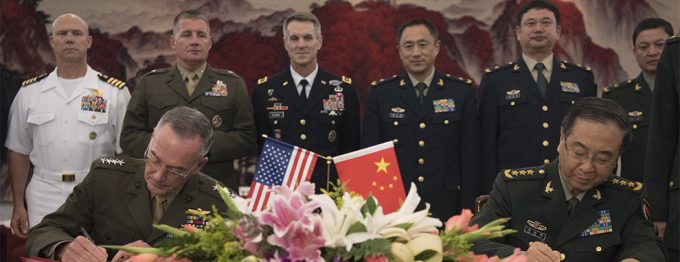The United States and China both want North Korea to abandon its nuclear weapons program. The North Korean leadership continues to defy them both. The United States says it is willing to risk a war to stop them. China is not.

Marine Corps Gen. Joseph F. Dunford Jr., chairman of the Joint Chiefs of Staff, signs the Joint Staff Dialogue Mechanism with his Chinese counterpart Gen. Fang Fenghui following a roundtable discussion in Beijing, Aug. 15, 2017. (DOD photo by U.S. Navy Petty Officer 1st Class Dominique A. Pineiro)
China’s top priority is preserving the peace, however uneasy that peace might be. A credible North Korean capability to launch a nuclear-armed ICBM may make US officials psychologically uncomfortable. But the Chinese leadership does not feel that increased US anxiety is a sufficient justification for starting a war that could conceivably kill hundreds of thousands of people and collapse Asia’s economy, even if no nuclear weapons were used.
China has made its priorities clear to both the United States and North Korea. An August 10 editorial published in China’s Global Times warned both sides against striking first. The editorial was not an official statement of Chinese government policy but it almost certainly was reviewed and approved at the highest level. It suggested to the leadership in Pyongyang that, “If North Korea launches missiles that threaten US soil first and the US retaliates, China will stay neutral”. It also suggested to Washington that, “If the US and South Korea carry out strikes and try to overthrow the North Korean regime and change the political pattern of the Korean Peninsula, China will prevent them from doing so.”
China has also made it clear that it will not agree to sanctions that strangle North Korea’s economy. China supports economic penalties that punish North Korea for defying the United Nations and continuing its testing programs. And China is willing to work with the United States and the international community to deny North Korea access to critical technologies. But on August 5th, in an official statement made at the time of the vote on the latest round of UN sanctions, China emphasized, as it has many times in the past, that China “did not intend to negatively impact such non-military goods as food and humanitarian aid.”
US Refusal to Listen
Though China’s position on North Korea is clear and consistent, US policy is based on the assumption that China’s position will change. On August 13th, US Secretary of Defense James Mattis and Secretary of State Rex Tillerson penned an editorial in which they repeated the claim, believed by most US policy makers and analysts, that China has “decisive diplomatic and economic leverage over North Korea.” The implication is that China can force the North Korean leadership to abandon its nuclear weapons program. The joint editorial reiterated a US policy announced earlier this year by Secretary Tillerson, who said the Trump administration was engaged in an unprecedented effort to “lean hard into China” in order to pressure its leaders to change their policy.
Presumably this means trying to compel China to take steps to strangle the North Korean economy. The United States reportedly attempted to include a crude oil embargo in the latest round of UN sanctions. But China refused, as it has in the past, to agree to sanctions that would have the kind of suffocating economic impact the United States believes would force North Korea to surrender its nuclear ambitions. In their editorial Tillerson and Mattis told their Chinese counterparts they expect China to “do more” than enforce the current round of UN sanctions. They want China to cut off North Korea’s “economic lifelines.”
US policy experts imagine there are several factors that might prompt the Chinese leadership to bend to US demands. Henry Kissinger raised the specter of nuclear proliferation in Asia, including a nuclear-armed Japan. Others believe the Chinese are worried about increased US economic and diplomatic pressure, especially President Trump’s statements linking Chinese cooperation on North Korea to punitive US trade policies. US observers of Chinese domestic politics speculated that Chinese President Xi Jinping may need to alter China’s longstanding policies on North Korea to mollify domestic critics as he makes his case for a second five-year term at the upcoming Party Congress in November.
China Remains Calm
Despite these imagined pressures, there is no indication that President Xi is about change China’s position on North Korea. Throughout the month of July there was very little Chinese coverage or commentary on the North Korean missile tests. Official statements repeated past calls for calm, mutual restraint and a resumption of negotiations. It wasn’t until President Trump’s threat to unleash “fire and fury” on August 8th, followed by North Korea’s threat to fire missiles towards Guam on August 9th, that the Chinese leadership had the Global Times publish the August 10th editorial containing more emphatic and explicit language.
Not long afterwards, North Korea walked back its threat to fire missiles at Guam. The United States then made a series of high level statements intended to diffuse tensions. In their editorial, Tillerson and Mattis questioned whether China was willing or able to “show the world how a great power should act.” History may well record that in this particular moment of high tension, China’s president acted with greater patience, skill and prudence than the president of the United States.
On August 14th, as tensions began to subside, an editorial in the overseas edition of China’s People’s Daily chastised both the United States and North Korea for “playing a game of chicken on the Korean peninsula.” That’s not the language of a country that lacks confidence in its current position or is overly concerned about upsetting the United States.
